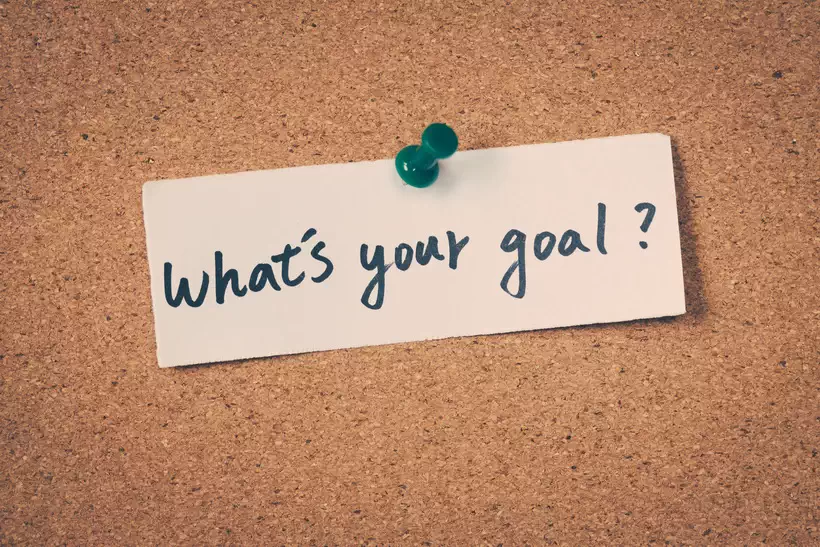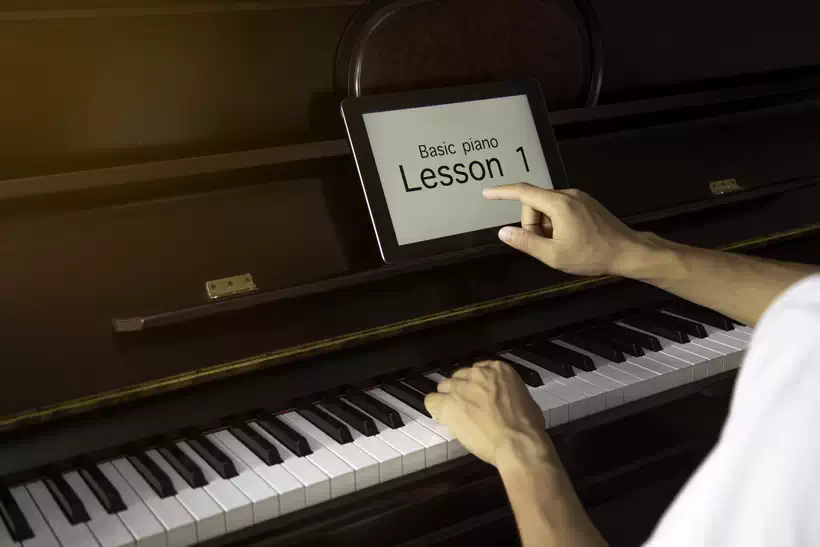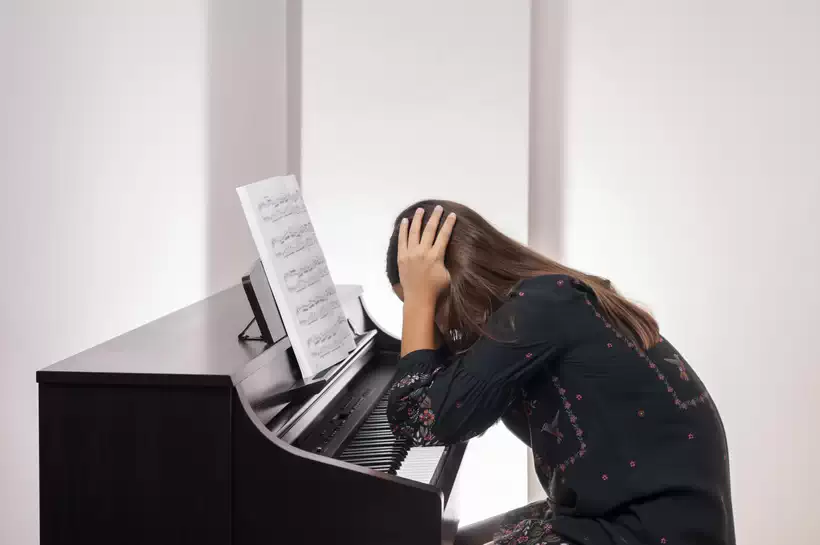It’s a question that almost all adult beginners have asked (or at least wondered) at some point. And it makes sense that piano students want to get good at playing piano fast.
The truth is that there’s no easy answer. Practice time, natural aptitude, your learning program, and other factors all play a role. And of course, if you want to be able to play at a high level, getting to that point takes much longer than reaching just basic competency.
No one can learn to play piano overnight, but there are certain things to keep in mind to maximize your progress while still having fun.
How Long Does It Take to Learn Piano?
Set Your Piano Playing Goals

Do you want to be a professional pianist one day? Do you mostly want to focus on learning songs to play for fun? Lots of people decide they want to learn to play piano, but they often don’t set goals beyond that. In the long run, not having a specific goal may hinder your progress.
But by setting goals for learning, you’ll be able to focus your learning (or a piano teacher will be able to focus a lesson plan) on those goals.
It’s fine to have a broad goal — maybe you want to learn enough to be able to play in a band. But it can be helpful to think of some smaller goals along the way. Do your best to make these goals measurable. Maybe there’s a specific piece of music you want to play fluently, or maybe you just want to be able to play simple songs or easy arrangements with both hands at the same time.
Once you’ve set goals, try to set a timeline. If you say you want to be able to learn a certain song in a month, having a deadline will help motivate you and hold you accountable.
If you want some extra guidance and suggestions on setting piano goals, check out this helpful video.
Choose Your Method For Learning Piano

Do you want to learn one on one with a piano teacher? Take an online piano course? Learn from piano books? It’s possible to successfully learn to play piano with any of these methods, but each one offers something the other methods don’t.
If you opt for piano lessons with an experienced teacher, you have the benefit of both a personalized lesson plan and a personalized critique of your playing. But as you likely already know, the main disadvantage of in-person piano lessons is cost. And depending on where you live, it may be tough to find a piano teacher nearby.
Online piano courses will give you the benefit of a structured learning program. You also have 24/7 access to lessons, so it’s easy to schedule lesson time around your existing schedule. However, the majority of online courses don’t give you the opportunity to receive personalized feedback on your form or playing.
If you want to learn to play piano on your own, do your best to put together some kind of learning map or plan. Many self-taught musicians reach a plateau at some point — simply because they don’t know what to learn next. A piano book or e-book can offer some guidance or structure.
You might find that a combination of methods is ideal. It’s not unusual to use an online course or piano book for the core of your learning, but occasionally take a few in-person piano lessons to address any bad habits or things to work on. To learn about some common pitfalls to avoid as a self-taught pianist, check out this video.
Consider Your Musical Background
Is it hard to learn piano? Your musical background (or lack thereof) can make a major difference in how tough it is to learn.
For instance, if you already know how to read sheet music, even if it’s for another instrument, learning to play the piano is likely to take less time. If you’ve never read sheet music before, learning to do so on its own can take a good bit of time.
Some people may try to speed their learning by simply not learning to read music at all. This usually ends up backfiring; it’s possible to play something like a simple song or two without being able to read music. But if you want to progress as a pianist in any meaningful way, not knowing how to read sheet music is sure to get in the way.
Musical development takes time, and having a solid foundation in music theory will help you avoid the large gaps in knowledge that many self-taught players develop over time. If you want to start building a foundation, check out this in-depth video course on piano music theory.
Natural Ability Matters
Although almost anyone can become proficient at playing the piano if they work at it, your natural aptitude is an important factor in your success. Learning music is a lot like learning a foreign language. If you’ve ever taken a language class, you likely found that some people seemed to learn effortlessly. Others took a little longer and had to study.
You don’t have to be a piano-playing prodigy, but having some natural aptitude will likely help you learn piano more quickly. There’s an ongoing debate among people in the music world over this topic. Some experts believe that natural ability makes a greater difference than hard work. Others believe hard work beats natural talent. If you’re interested in getting more into that debate, check out this video.
How Much Time Do You Have To Play Piano?
It’s hard to estimate how long it takes to learn piano without considering how long and how frequently you practice. Just about any piano teacher will tell you that it’s better to have shorter, consistent practice sessions than periodic practice sessions lasting many hours. If you can manage the daily practice, that’s ideal.
If you’re a very busy person, consider blocking out dedicated practice times. That can help you maintain your practice frequency and stick to your schedule when life gets hectic.
It may also help to keep a piano practice log. That way, you can look back and see what level of practice seemed to result in the most progress.
Ultimately, if you have enough time (or are able to make enough time) to stick to a dedicated practice schedule, you’ll be much more likely to make progress quickly. Don’t discount short sessions — most teachers will tell you that even daily 15-minute practice sessions make a major difference over time. This video introduces you to a 10-minute practice routine, too!
This isn’t to say that you can’t reach higher levels of ability if you practice sporadically. But if you don’t play consistently, it will take a much longer time for you to reach intermediate and advanced levels of proficiency.
Understanding General Milestones
When it comes to learning piano, you already know there’s no one-size-fits-all timeframe. But how long does it take on average? Different piano teachers will tell you different things, but here are a few general time frames.
Most beginners are able to play simple songs within a week or so. But if you start as a complete beginner and practice piano consistently, you should be able to understand the keys and how they work. You also should be able to play some simple songs with one hand.
It takes about six months to reach what most people would call the “intermediate” level of piano. This phase lasts a while. You’ll be putting everything together and really starting to understand the theory. You’ll also probably practice drills to build up your technical abilities. In the intermediate stage, it’s easy to feel like you’re on a plateau.
This is also when a lot of players give up. But if you’re able to do the work, it will help shape you into a much better pianist. If you’re wondering whether you’d be considered a beginner or intermediate player, this video can help you figure it out.
On average, adult beginners who start out knowing nothing can reach the “advanced” stage of playing piano in about six months. An advanced player should be able to learn just about any song (excluding very difficult or technical pieces). However, it may take them a good bit of time to learn them. At this point, most people would probably describe you as being “good” at the piano.
To get to the level of what most people would consider “mastery,” a good portion of experts estimate that you would need around five years of consistent and dedicated practice.
Of course, as any musician can tell you, you’re never really done learning. If you have a real interest in piano and continue to practice regularly, you’re likely to just keep improving.
Focus On Solid Technique
Some beginners try to shorten the learning process by not paying attention to proper technique. But any player at the advanced level can tell you how important it is to learn proper technique right away. Bad habits can develop quickly, and once they effectively become part of your muscle memory, they can be very, very difficult to break.
The right piano technique starts with posture — something that’s almost always taught in your very first lesson. As a beginner, it’s tempting to rush through lessons on technique and finger placement. But if you take the time to really develop good technique, your future self will thank you! This video will show you some easy exercises designed to help you build good techniques.
It Depends On Your Interest
Consistent practice is certainly important, but the focused practice is key as well. And if you enjoy playing, focused practice will come naturally. For someone disinterested in the instrument (like some kids whose parents make them take piano lessons), practice is absentminded.
This type of practice won’t do a whole lot for you in the long run. If you’re focused and engaged, it will be easy to zero in on your weak points and work to correct them. Essentially, with a focused practice session, you’re cognizant of the fact that everything you practice is helping you build toward your goals. In other words, you’re practicing with a purpose.
The more eager and determined you are to learn how to play piano, the faster you’ll learn. For instance, a lot of people find music theory boring. If you’re very interested in piano, you may find yourself delving into theory, working on ear training, and seeking out other resources on how to improve. In other words, you’ll stay involved and excited about the learning process. Check out this interesting video on practice and motivation — it may help on the off days when you don’t feel like practicing.
As a side note, having a good-quality acoustic piano, digital piano, or keyboard to learn on can work to further inspire your interest. Quality instruments sound better. And if everything you learn to play at first sounds awful, you’ll be a lot less likely to want to give up.
Be Patient As You Learn Piano
Lots of new players ask if it’s possible to learn piano within a year. If you work hard, you may be able to progress from a total beginner to the intermediate level (or even the advanced level) in a year. But musical development is never really over.

Patience is generally important to have. But if you’re continually getting frustrated with yourself for not progressing as fast as you’d hoped, that takes your focus off of the actual learning process.
As you learn how to play, you may find your progress stalled by roadblocks you hadn’t considered before. For instance, it can take some time to build up the finger strength needed to play even 15 minutes a day.
You may find yourself making impressive progress, only to have it slow when you run into a major challenge. For instance, students learning how to play at the beginner level often have some trouble learning how to play with the right hand and the left hand at the same time. This video offers some advice on overcoming learning plateaus.
Ultimately, if you do your best to relax and enjoy the journey, you’ll be less frustrated with yourself (and will likely actually learn faster). This is easier said than done, of course. Some musicians recommend treating everything you play as a musical endeavor. Practicing scales may feel like a boring drill, but when you try to find the musicality in it, it will almost certainly become more interesting!
Want To Learn Faster?
How long does it take to teach yourself piano? It’s almost always a faster process if you use lessons designed and taught by a piano teacher (or many piano teachers). And you can have access to these types of piano lessons online and on-demand if you choose an online learning program.
One of the biggest advantages of these programs is their ability to incorporate music theory into carefully-structured lesson plans — you get to apply concepts as soon as you learn them. And in most cases, you can try out a few lessons before you commit to any given program!
Final Thoughts
So how long does it take to learn piano? Ultimately, there’s no real answer — your piano teacher or learning program, your motivation, and other factors all come together. But the most important thing to remember is that playing piano or any musical instrument is a journey in itself — you’re never really done learning.
What do you think? Do you have any words of wisdom for those just learning to play the piano? Let us know in the comments, and don’t forget to like and share if you found our list helpful. Happy practicing!
